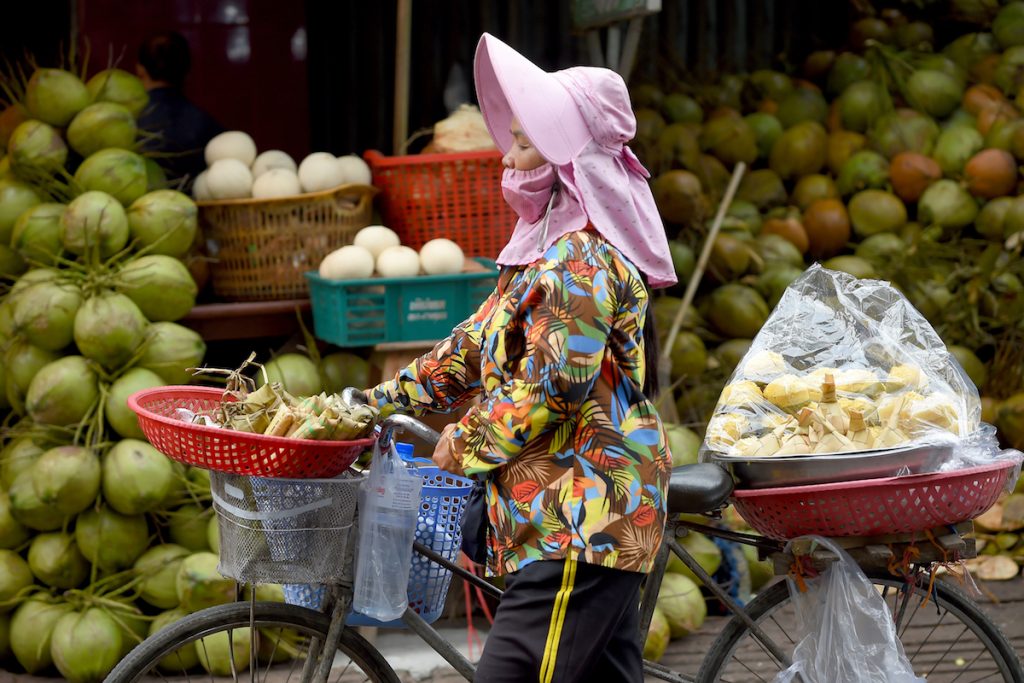Cambodian migrant workers return home to bleak prospects
or the past couple of years Sun Chen, 23, worked at a second-hand shoe store in Longkluor market in Thailand, just across the border with Poipet, Cambodia. He was happy with his job, but last week he had to leave it behind.
“I was forced to stop working and to return to Cambodia on March 22,” Chen told LiCAS.news. “The Thai police said that we had to leave after lunch, because they would shut down the border the next day.”
Shopping malls, construction sites and factories have likewise been closed in Thailand to contain the spread of the novel coronavirus. The measures have resulted in tens of thousands of Cambodian workers, like Chen, leaving their jobs and returning home.
Their future now seems uncertain.
“When I arrived at my sister’s dorm, her landlord found out that I came from Thailand,” Chen said.
“The landlord then reported me to the local authorities and told me that I’m not allowed to stay because I’m a migrant worker returning from Thailand,” he explained.
“The authorities measured my temperature. Even though it was a normal 37 degrees and even though I’m healthy, the landlord still didn’t let me stay with my sister. It was discriminating.”
With few other options, Chen went to his brother-in-law’s home in Kampong Cham province where he was accepted.
“But I don’t go around the village as I have been asked [to quarantine and] monitor myself for 14 days to make sure I’m not infected with the virus,” he said.
Spreading it to remote areas
Together with Myanmar and Laos, Cambodia is a major supplier of migrant workers for Thailand. Working in a wide range of sectors, they play an essential role in Thailand’s economy. The UN-run International Organization for Migration estimates Thailand employs between 4 to 5 million migrant workers.
According to Cambodia’s Ministry of Labor, about 1.2 million Cambodians were working in Thailand in 2018.
From March 22 – 26 about 40,000 Cambodian migrants returned from Thailand, Cambodia’s Interior Minister Sar Kheng said during a visit to the border in Oddar Meanchey province.
Experts have expressed serious concerns that the coronavirus may travel with the migrants returning to their home country, spreading it to remote areas that are currently virus free.
Sar Kheng acknowledged the risk, but he said with so many people coming back that the authorities are unable to keep everyone at the border.
“We can’t keep them at the border for 14 days, but we keep track of them at their own hometown by asking local authorities to keep a very close eye on them,” Sar Kheng said. “We ask the migrants to separate and isolate themselves from their family for 14 days.”

Tong Sarin, 28, and her husband also came back to Cambodia. They crossed the border in Battambang where the authorities checked people’s temperature, seeing if they showed signs of infection.
“But the authorities didn’t tell us anything about how to prevent COVID-19 from spreading, because it was very crowded at the border,” Sarin said.
“They allowed everyone to go through, except for people who had a temperature higher than 37.5 degree or so.”
Sarin and her husband were afraid of the consequences of a closed border such as not seeing their 2-year-old son for the upcoming Khmer New Year festivities. The couple said they were asked to self-quarantine for 14 days.
“After the quarantine we want to look for a job in Cambodia, as we can’t go back to Thailand at the moment,” she told LiCAS.news.
But finding a new job in Cambodia is not easy. With factories closed and tourism devastated, the country’s economy is cracking.
“I’m not sure if there are any jobs available. I’m looking for work in a factory, but I don’t see any factories wanting new employees with this COVID-19 crisis,” Sarin said.
Like many other Cambodians she desperately needs work.
“I didn’t save enough money when my husband and I worked in Thailand, as we had a loan to pay and every month my workplace would deduct almost 20,000 baht in expenses,” she said over the phone.
“And now a health expert suggested to me that I isolate myself from my son. It’s so difficult to look at him from a distance and to not be allowed to touch him,” she said.
“So, I now live with my brother in Phnom Penh. I’m concerned I will spread the virus if I hug my son.”
Sun Chen said that once his 14-day quarantine was over, he also needs to look for paid work somewhere in Cambodia.
“I’m not sure what jobs are available, but wages are lower here compared with what I made in Thailand,” he said.
Minister Kheng admitted that such a massive return of migrant workers will impact the domestic economy, while adding that it’s not just a crisis for Cambodia — who, as of April 2, have 110 confirmed COVID-19 cases — but for the entire globe.
Khun Tharo, the program manager of Labor and Human Right NGO Central, said the Cambodian government has to implement adequate fiscal policies to assist workers negatively impacted by the effects of COVID-19.
Social protection measures need to be instigated such as “unemployment benefits, social assistance, and public employment programs, for all categories of [affected] workers,” Tharo told LiCAS.news.
As for Chen, he feels lucky to have some savings from his work in Thailand but wonders how long his funds will last.
“Right now, I don’t have an income. If the situation continues like this, I won’t have any more savings after a few more months,” he said.
Source: Licas.news


